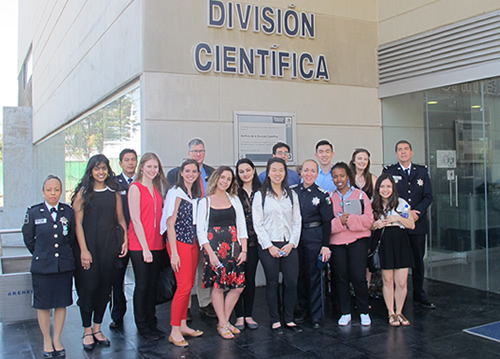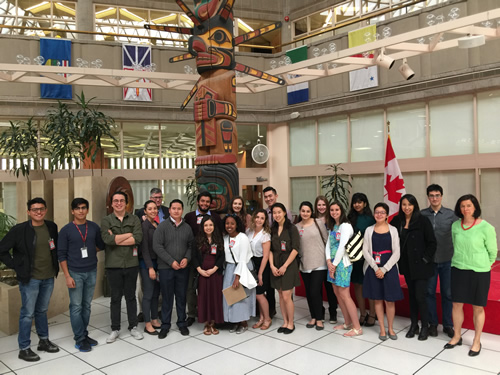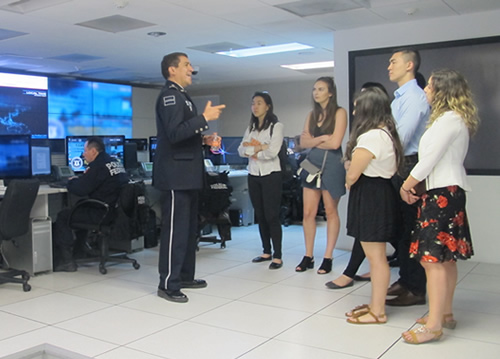What you might be thinking when you hear about students heading to Mexico during Reading Week: sun, beach, umbrella, lime in cold beverage, a couple of thousand kilometres away from textbooks.
Not quite for a group of fourth-year Arts & Science students in an Organized Crime and Corruption course at the Centre for Criminology & SocioLegal Studies.
Instead of a swim in the ocean, these students dove headfirst into the complicated world of Mexico’s narco-insurgency and organized crime. Instead of an umbrella, they were protected by an armed convoy of the Mexican Federal Police.
The students were part of an International Course Module (ICM) designed and led by Matthew Light, an associate professor in criminology & sociolegal studies in the Faculty of Arts & Science. The ICM program allows faculty to incorporate real-life international experiences into existing undergraduate courses.
Mexico has the most significant mafia insurgency in the world
Light said he chose Mexico because the country is the site of the most significant mafia insurgency in the world right now.
“Since the early 2000s, the conflict involving the Mexican government and the drug cartels has caused casualties on a scale similar to an actual war,” said Light. “Parts of the country are now heavily infiltrated by the cartels, and the crisis is highly relevant for Canada as well, because Mexico is a close neighbour and major trading partner of this country.”
Light worked in conjunction with Professor Monica Serrano of El Colegio de Mexico, a leading expert on Mexico’s security crisis, to line-up meetings, guest speakers and tours for the students.

“I think the students particularly loved the two tours we were given of the Mexican Federal Police Headquarters, where we saw a remarkable display of law enforcement technology and training methods,” said Light.
But for Michelle Salamat, a double major in criminology & sociolegal studies and ethics, society & law, the security convoy that drove ahead of the U of T group on the way to the Federal Police Tactical Operations Centre was the highlight of her trip.
“It was surreal to watch as we followed police officers with huge rifles standing in a pickup truck”
“It was surreal to watch as we followed police officers with huge rifles standing in a pickup truck,” she said. “I was very taken aback by the hospitality and the enormous efforts made by the Mexican Police to inform us of the work that they do.”
Gloria Baron, who is combining sociology and criminology & sociolegal studies, says she welcomed the opportunity to see Mexico firsthand because it allowed her to directly witness the reality of that country’s security crisis.

“Getting to see the heavy police presence and to hear different perspectives on the security crisis significantly enhanced my understanding and learning of the subject,” said Baron. “We got to learn, engage with, and ask questions to different speakers, and discuss key issues in the security and drug crisis with the class.”
Kimberly Legate, who is studying psychology and criminology & sociolegal studies, says her experience helped her become comfortable asking critical questions and gave her an informed opinion of the drug conflict.
“I learned to not be intimidated by experts in a given field, and to take advantage of every opportunity to ask questions,” said Legate. “The trip also gave me a better idea of the abundance of unique positions available for people with criminology backgrounds.”
Salamat said the connections that the Arts & Science students made with Mexican students from El Colegio de Mexico were also very informative. Legate agreed, noting “We were able to get a first-hand account of what everyday life is like in Mexico, especially through the political and legal changes that have occurred over the past 10 years.
“It was an amazing experience to hear opinions from both sides of the issue”
“Many of the Mexican students gave us their opinions on the Federal Police’s approach to fighting the drug cartels,” she said. “It was an amazing experience to hear opinions from both sides of the issue, with one student noting that he had a more favourable view of the cartels considering the resources that they have provided to his village back home.”
Light credits the success of the trip in part to the valuable help throughout from Valentin Pereda, a PhD student at U of T’s Centre for Criminology & Sociolegal Studies, especially when it came to navigating Mexico City.
“[Mexico City] is an enormous metropolis of some 25 million people, with some of the worst highway traffic conditions in the world,” said Light.
Pereda helped U of T students discover the city and become familiar with Mexican culture. Exploring that culture was Gloria Baron’s favourite part of the trip.

“Getting to visit the museums, pyramids, and meeting the local Mexican students on the trip was wonderful,” said Baron.
It wasn’t all guns and drugs for Light either.
“I personally really enjoyed showing the students the Museum of Anthropology, an incredible treasure trove of Pre-Columbian art and artefacts from all over Mexico,” said Light. “It is surely one of the great museums of the world.”
On a whole, the students who partook in this ICM said they found the experiences they had closely related to their area of study and they also became aware of future academic and career opportunities.
Oh, but don`t forget the fun too, because that is also an important part of any Reading Week.
“I would never have imagined that I would be escorted by a Mexican police convoy, nor would I have ever seen myself at a Mexican wrestling match,” said Salamat. “I can confidently say that I had made memories on this trip that will last a lifetime.”

